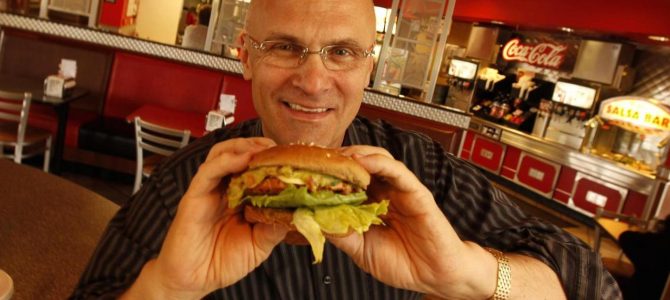According to reports, President-elect Donald Trump is expected to name Andy Puzder as his Labor secretary. Like most of his cabinet picks, Puzder is a competent, moderate, mainstream selection. Not that it matters. The Left is horrified again. So let’s set aside the fiction that progressives are principally concerned about Trumpism. What really freaks them out is conventional conservativism.
Puzder (who once wrote columns for a publication I helped edit) is chief executive of CKE Restaurants Holdings Inc., the Carl’s Jr. and Hardee’s burger chains. Puzder is an advocate for deregulation, open markets, tax cuts, and other free-market policy proposals that keep labor markets healthy and economies growing.
So how does The New York Times headline its story about Puzder? “Trump’s Expected Labor Pick, Andrew Puzder, Is Minimum Wage Critic.”
The paper seems surprised that a prospective Labor secretary might not support policies that conservatives believe kill jobs. In 2013, the same newspaper headlined their piece, “Obama Nominates Thomas E. Perez as Labor Secretary,” not “Obama Nominates Thomas E. Perez, Critic of Capitalism, Free Trade and Productive Jobs.”
There were so many puff pieces about Obama Labor Secretary Hilda Solis you’d think she was actually qualified for the position.
In their defense, though, the Puzder pick is a change of pace. The Times is concerned that the last time a Labor secretary lacked government experience was in early 1980s when Ronald Reagan nominated Raymond Donovan. And you know what happened then, right? “Mr. Donovan’s tenure was marked by an easing of numerous regulations,” the Times reporters tease.
Admittedly, I’ve had a soft spot for Hardee’s. In the midst of the nanny-state panic of the mid-2000s, when governors like Mike Huckabee were passing laws to inhibit consumer choice and companies were diluting their delicious fast food with gross salubrious alternatives, the company introduced a “monument to decadence” called the “Monster Thickburger.” It was 1,420 calories with 107 grams of fat. You probably remember the ads.
The New York Times’ former in-house union advocate, Steven Greenhouse, remembers. Others also seem upset that Puzder’s company featured various barely clothed women selling burgers. Hold onto your soy latté, but Puzder once also said, “I like our ads. I like beautiful women eating burgers in bikinis. I think it’s very American.”
Factcheck: zero Pinocchios.
Puzder’s positions have more in common with long-held conservative ideas than with Trumpism. In fact, he probably holds views that most elected Democrats would have shared 10 years ago. But since progressive economics became doctrine in the Democratic Party, basic economics has become controversial.
Take the Center for American Progress’s Igor Volsky, the perfect strawman to help explain reality. He tweets:
Trump nominated CKE Restaurants CEO Andrew Puzder 4 Sec of Labor
Puzder opposes raising min wage&has replaced fast food workers w/machines
— igorvolsky (@igorvolsky) December 8, 2016
Yes, Barack Obama might lament the rise of ATMs, and Republicans might talk about “saving” manufacturing jobs (that are now automated), but reality is unmoved. This is why, as Sean Davis points out, Volsky is tweeting rather than using a telegraph operator. Or, as Nobel Prize-winning economist Paul Krugman once explained: “So what are the effects of increasing minimum wages? Any Econ 101 student can tell you the answer: The higher wage reduces the quantity of labor demanded, and hence leads to unemployment.”
The thing is that Puzder’s positions are far more nuanced than they’ve been portrayed so far, anyway. As he explained in this Los Angeles Times piece, Puzder views fast-food as an entry into managerial careers and the wider workforce, rather than a career in itself. His company has offered all kinds of assistance in making this happen. Such assistance is worth far more than a minimum wage law.
Puzder is such a radical, in fact, that a few years back he was arguing for more (legal) low-skilled immigrant workers in high-turnover industries. But anyway, despite leftist pushback over his selection, the only people who might be able stop Puzder are in the protectionist wing of the GOP, not in the Democratic Party. Harry Reid saw to that.









